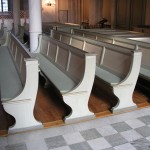Thanks for all the responses to my post this weekend asking for advice on RCIA and the tone of the blog . Tomorrow, I’ll be returning to the ongoing series about Diane Duane’s Young Wizards books and what they’ve taught me about religion, but I wanted to take a break today to deal with some questions Saturday’s post brought up.
Kevin brought up a problem that goes to the heart of the blog and one that I’ve heard before.
This kind of argumentation just isn’t what makes people religious. Despite the way some Catholics talk, religion first and foremost isn’t a matter of theology. Theology’s kind of an afterthought, icing on the religious cake. I have full confidence that the Christian religion can hold up to any dialectical challenges that are brought against it, and I have a great personal interest in intellectual questions of that nature. But if you were to ask me why I’ve continued in the faith, theological dialectics would have very little to do with it.
And so this whole blog, on my view, has been rather missing the point. But it’s not really your fault — the real reasons for faith are hardly the sort of thing that can be easily hashed out in a comment box. A confessional box, maybe.
Kevin makes a fair point. I certainly won’t be so arrogant as to claim that the apologetic works I’ve read comprise all possible defenses of Christianity, or that I’ve necessarily read them so well as to justifiably be unconvinced. The fact remains, though, that I find them unconvincing. And the more I read and remain unconvinced by, the more likely it is that the next book or argument will also leave me unconvinced.
At this point, I do doubt I can be argued into Christianity, which leaves only some kind of experiential miracle in God’s arsenal, as far as I can tell. Jen Fulweiler of Conversion Diary has some advice for atheists or agnostics as part of her post “Finding God in 5 Steps”
Do the Experiment
I believe that God’s existence can be “proven” in a certain sense, as long as you understand that God = Love, and what you’re trying to prove is Love itself. This is not something you can know about from analyzing data or reading books alone. To get the “proof” that you seek, you must enter the laboratory of your heart, and actually conduct the experiment: live, for a while, as if God did exist. Pray. Follow the Ten Commandments. Show love and kindness to everyone, even your enemies. Read the Bible. Give God the thanks and honor and respect you would show him if he did exist. As Pascal suggested, just try it for a while, and see what happens.
I can’t claim to have lived up to these instructions perfectly. I’ve been attending Mass weekly for about six months, reading apologetics, talking to priests and a deacon, and even trying prayer for Lent (unsuccessfully, natch). Obviously, my scientist heart is frustrated that Jen’s experiment is open-ended. There’s no amount of time I could spend living her experiment to refute the premise; it only ‘works’ if I convert.
I’m curious what devout Christians would tell me to do rather than/in addition to blogging.
If atheists aren’t convinced by intellectual arguments, have they done their due dilligence? Do they fall into the category of invincible ignorance?
How can someone reach beyond theology to grapple with a religion they believe to be false?
If you could ask me to take any action that you thought would be likely to convert me, what would it be?












